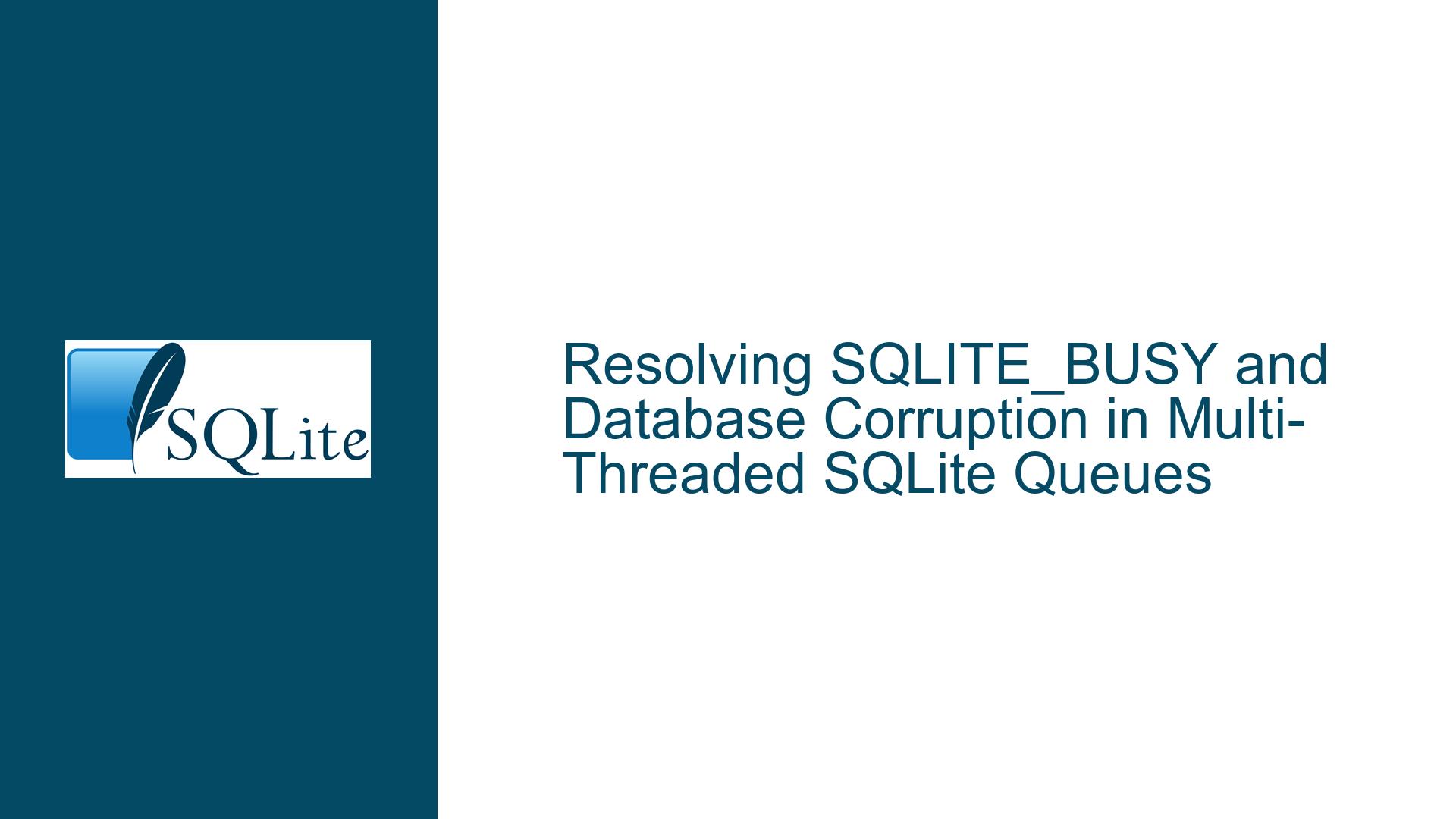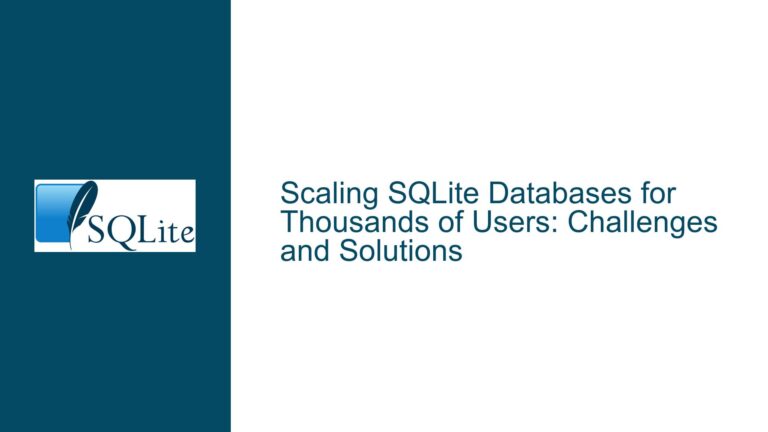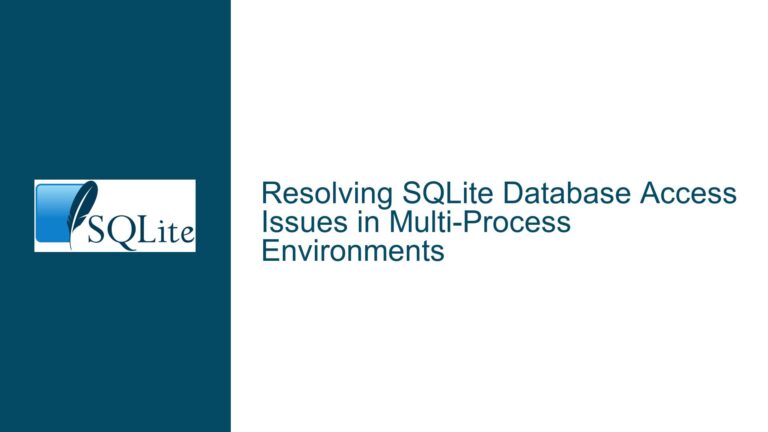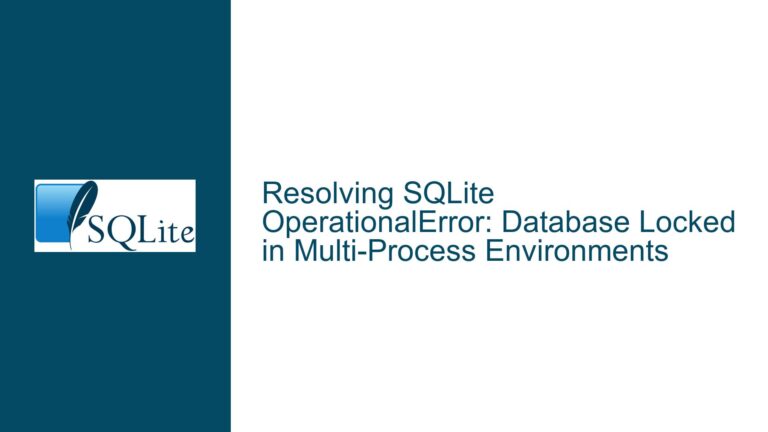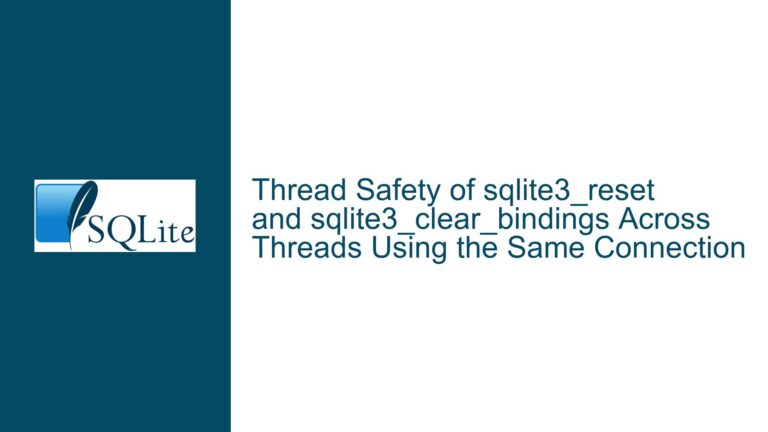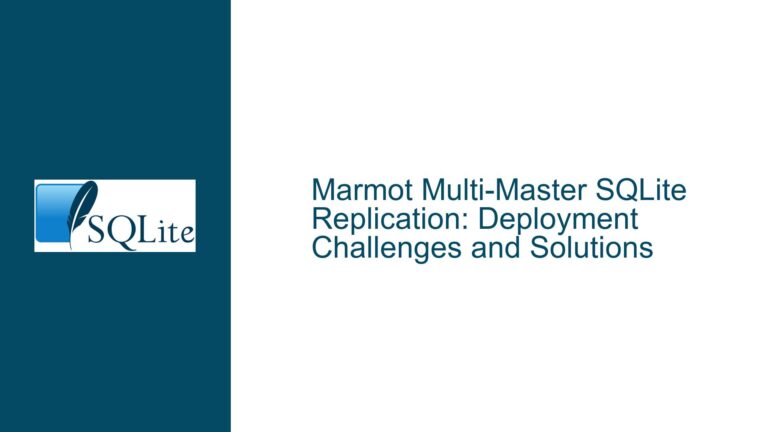Resolving SQLITE_BUSY and Database Corruption in Multi-Threaded SQLite Queues
Understanding Lock Contention and WAL Corruption in High-Concurrency SQLite Implementations
Database Locking Mechanisms and Concurrency Failure Modes
SQLite employs a locking protocol to manage concurrent access to database files. In multi-threaded environments where threads perform read and write operations simultaneously, two primary failure modes emerge:
- SQLITE_BUSY (database locked): Occurs when a thread attempts to acquire a reserved/exclusive lock while another thread holds a pending/exclusive lock. This is common in queue-based systems where worker threads compete to update task statuses.
- SQLITE_CORRUPT (malformed disk image): Typically observed in Write-Ahead Log (WAL) mode when concurrent writers interfere with WAL index updates or checkpoint operations. The corruption risk increases when multiple processes/threads share WAL files without proper synchronization.
The locking hierarchy progresses through UNLOCKED → SHARED → RESERVED → PENDING → EXCLUSIVE states. Write operations require RESERVED locks during statement preparation and EXCLUSIVE locks during commit. Read operations hold SHARED locks. WAL mode modifies this by allowing readers and writers to operate concurrently through separate WAL files, but introduces new coordination requirements during WAL file rotation and checkpointing.
Thread starvation occurs when:
- Long-running write transactions block other writers
- Read transactions prevent write lock acquisition (in default rollback journal mode)
- Improper WAL checkpoint management leads to file size bloat and I/O contention
- Unreleased prepared statements maintain SHARED locks indefinitely
Root Causes of Lock Contention and WAL Corruption
Lock Acquisition Failures (SQLITE_BUSY)
- Missing Busy Timeout Configuration: Without sqlite3_busy_timeout() or equivalent, SQLite immediately returns SQLITE_BUSY rather than retrying lock acquisition.
- Transaction Scope Mismanagement:
- Holding transactions open while performing non-database work (network I/O, computation)
- Using DEFERRED transactions for write operations instead of IMMEDIATE/EXCLUSIVE
- Nested transactions causing unpredictable lock release timing
- Zombie Statements: Prepared statements (sqlite3_stmt) not reset/finalized retain SHARED locks, blocking schema changes and write transactions.
- Connection Per-Thread Contention: Sharing database connections across threads without synchronization, violating SQLite’s thread-unsafe connection model.
WAL File Corruption (SQLITE_CORRUPT)
- Checkpoint Collisions: Concurrent checkpoint operations by multiple threads corrupt the WAL index (wal-index). The wal-index is memory-mapped and requires atomic updates.
- Incomplete WAL Frame Writes: Power loss or OS crashes during WAL frame writes leave invalid checksums.
- File System Caching Issues: Delayed persistence of WAL files to disk when using asynchronous I/O (PRAGMA synchronous=OFF).
- Shared Memory Region Conflicts: Incorrect configuration of the wal-index shared memory when using multiple processes with the same WAL file.
Distributed Database Misconceptions
SQLite is an embedded database without built-in client-server capabilities. Attempts to "distribute" it typically involve:
- Network file systems (NFS/SMB) that lack proper POSIX locking semantics
- File replication solutions that duplicate database files without coordination
- Application-level sharding without transaction boundaries
Comprehensive Lock Management and WAL Optimization Strategies
Lock Contention Resolution
1. Transaction Control Protocol
Immediate Transactions for Writes:
sqlite3_exec(db, "BEGIN IMMEDIATE", 0, 0, 0); // Execute UPDATE/INSERT sqlite3_exec(db, "COMMIT", 0, 0, 0);IMMEDIATE transactions acquire RESERVED locks immediately, preventing other writers from entering RESERVED state. DEFERRED transactions (default) upgrade from UNLOCKED to RESERVED during first write, creating lock contention windows.
Idle Transaction Timeouts:
Automatically rollback transactions that exceed maximum allowed duration:PRAGMA busy_timeout = 3000; -- 3-second retry before returning SQLITE_BUSY PRAGMA lock_timeout = 5000; -- 5-second maximum wait for EXCLUSIVE lock
2. Connection and Statement Lifecycle Management
Dedicate Connections Per Thread:
SQLite connections and prepared statements are not thread-safe. Each thread must:sqlite3 *thread_db; sqlite3_open_v2("queue.db", &thread_db, SQLITE_OPEN_READWRITE | SQLITE_OPEN_FULLMUTEX, NULL);FULLMUTEX mode (serialized threading mode) allows safe connection sharing but requires manual mutex management.
Statement Finalization Protocol:
Always finalize/reset statements after use:sqlite3_stmt *stmt; sqlite3_prepare_v2(db, "UPDATE queue SET status=? WHERE id=?", -1, &stmt, 0); sqlite3_bind_int(stmt, 1, STATUS_COMPLETE); sqlite3_bind_int64(stmt, 2, event_id); while (sqlite3_step(stmt) == SQLITE_ROW) { /* ... */ } sqlite3_reset(stmt); -- Release SHARED lock sqlite3_finalize(stmt); -- Release all resources
3. Lock Diagnostics and Monitoring
- Pending Lock Identification:
Query SQLITE_MASTER lock status through OS-specific tools:lsof -ad 10-999 -c your_app_name # Show open database file descriptors fuser -v queue.db # List processes holding file locks - SQLite Internal Lock State:
PRAGMA lock_status; -- Output example: -- database|main|1 -- wal-index|main|0Value 1 indicates EXCLUSIVE lock held on main database.
WAL Mode Configuration and Corruption Prevention
1. WAL Checkpoint Tuning
- Automatic Checkpoint Threshold:
PRAGMA wal_autocheckpoint = 1000; -- Checkpoint when WAL reaches 1000 pages PRAGMA journal_size_limit = 1048576; -- 1MB maximum WAL size - Manual Checkpoint Coordination:
Perform checkpoints during low activity periods:sqlite3_wal_checkpoint_v2(db, NULL, SQLITE_CHECKPOINT_PASSIVE, NULL, NULL);Use PASSIVE mode to avoid blocking writers.
2. WAL File Durability Settings
Synchronous Commit:
PRAGMA synchronous = NORMAL; -- Balance between safety and performanceNORMAL syncs WAL frames to disk on transaction commit, while FULL syncs both WAL and database file.
WAL File Isolation:
Store WAL files on local (non-network) storage with battery-backed write cache. Disable OS-level file caching for WAL:sqlite3_file_control(db, NULL, SQLITE_FCNTL_PERSIST_WAL, &persist_wal);
3. Corruption Recovery Protocols
- Pre-Transaction Integrity Checks:
PRAGMA quick_check; -- Fast consistency validation PRAGMA integrity_check; -- Comprehensive validation (expensive) - WAL File Reset:
Recover from malformed WAL by forcing rollback journal mode:PRAGMA journal_mode = DELETE; -- Disable WAL PRAGMA journal_mode = WAL; -- Re-enable WAL with fresh files
Distributed SQLite Alternatives
1. Application-Level Sharding
- Partition queue tables by thread affinity:
CREATE TABLE queue_worker1 (id INTEGER PRIMARY KEY, event BLOB); CREATE TABLE queue_worker2 (id INTEGER PRIMARY KEY, event BLOB);Assign threads to dedicated tables using modulo hashing.
2. Client-Server Proxies
- Use LiteFS or dqlite for replication:
// dqlite example store := dqlite.NewNode("node1", "192.168.1.1:9000") driver := dqlite.NewDriver(store) db, _ := sql.Open("dqlite", "queue.db")These solutions add coordination overhead but enable multi-writer setups.
3. Hybrid Queuing Architectures
- Buffer writes in memory with periodic SQLite flushes:
class BufferedQueue: def __init__(self): self.buffer = [] self.flush_threshold = 1000 def add_event(self, event): self.buffer.append(event) if len(self.buffer) >= self.flush_threshold: self.flush_to_sqlite() def flush_to_sqlite(self): with sqlite3.connect('queue.db') as db: db.execute("BEGIN IMMEDIATE") db.executemany("INSERT INTO queue VALUES (?)", self.buffer) db.commit() self.buffer.clear()Reduces SQLite write frequency while maintaining durability.
Thread Lock Attribution Techniques
1. SQLite Extended Error Codes
Enable extended error codes to diagnose lock sources:
sqlite3_extended_result_codes(db, 1);
// Error returns SQLITE_BUSY (5) → SQLITE_BUSY_SNAPSHOT (517)
2. Custom Lock Tracing Functions
Override SQLite’s locking functions via sqlite3_vfs:
static int xLock(sqlite3_file *pFile, int lock) {
printf("Thread %d acquired lock %d\n", pthread_self(), lock);
return original_vfs->xLock(pFile, lock);
}
sqlite3_vfs_register(&instrumented_vfs, 1);
3. Thread Activity Stack Sampling
Periodically capture thread stacks to identify long-running transactions:
void *monitor_thread(void *arg) {
while (1) {
pthread_mutex_lock(&thread_map_mutex);
for (ThreadInfo *ti : thread_list) {
if (ti->last_sql) {
printf("Thread %d executing: %s\n", ti->id, ti->last_sql);
}
}
pthread_mutex_unlock(&thread_map_mutex);
sleep(1);
}
}
Concurrency Stress Testing
Implement randomized load testing to surface locking edge cases:
def stress_test():
def worker():
for _ in range(1000):
time.sleep(random.uniform(0, 0.1))
if random.random() < 0.3:
execute_read_query()
else:
execute_write_query()
threads = [threading.Thread(target=worker) for _ in range(20)]
for t in threads: t.start()
for t in threads: t.join()
Analyze test results with:
SELECT * FROM sqlite_stat1 WHERE tbl='queue'; -- Check index utilization
ANALYZE;
This guide provides exhaustive coverage of SQLITE_BUSY and WAL corruption scenarios, offering both preventive measures and diagnostic techniques. Implementation requires careful integration with application architecture, particularly in transaction scoping and connection handling.
